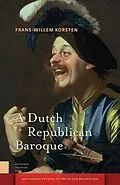This study offers a new and systematic approach towards the interactions among the notions of theatricality, dramatisation, moment, and event
Autorentext
Inhalt
Acknowledgments1. Republican baroque: a thunderclap, a city hall and two executions1.1. Artifice: multiple worlds and one actualized1.2. Why a Dutch Republican baroque; and why not a Golden Age?1.3. City hall: affect - or what moves and what drives1.4. Thunderclap: moment and event1.5. Two executions: theatricality and dramatization1.6. Republican baroque and slavery2. The dramatic potential in history: Rome and the Republic - Grevius, Vondel, Knüpfer, and Job2.1. Two incompatible political models: transfer or disruption?2.2. Allegory tied into a knot: history's continuity dramatically disrupted2.3. Perverse powers, or how to make fun of the theater of torture2.4. Catholic Rome and the figure of Job: subjection to the only possible world3. The cruel death of worlds and political incompatibility - the brothers De Witt3.1. Foundations of law: the master/father of a political house3.2. The lynching of the De Witts: condensation and spectacle3.3. The ship of state and the cruel political choice between incompatible worlds3.4. Combat, the dramatic logic of cruelty, and the potential of difference4. A happy split of worlds or the comedic sublime - Hals4.1. Happiness, the comedic, and the sublime4.2. Steen and Vondel: comical and tragic counterpoints to the comedic4.3. The sublime intensity of the moment4.4. Freedom: necessity and contingency5. The seas or the world as scene - Focquenbroch and Grotius5.1. Pre-colonial mise-en-abyme: Focqenbroch and a non-republican baroque5.2. Moment of exchange and a non-existent 'proper'5.3. Juridical staging: commerce and the sea5.4. The precariousness of mise-en-scène5.5. Amsterdam: city and sea as world scene6. Not a frame but a lens: the touch of knowledge - Rumphius, Vossius, Spinoza6.1. Spectacle or theater: Rumphius as knowledge-trader6.2. Nature internalized: res cogitans reconsidered6.3. Sensing the world differently: the telescope6.4. Reading through a lens: intensity and texture before scripture7. Public theater, collective drama and the new - Van den Enden and Huygens7.1. Theatrum mundi, public acting and the plane of collective imagination7.2. Speaking for those who understand: a school drama in a theater7.3. Dramatization: theatrum mundi versus mundus dramaticus 7.4. Fluid borders between theatricality and dramatization: Huygens's Sunday8. Interrupting time for the sake of division: history and the tableau vivant - Rembrandt (Abraham and Isaac), Quast, Vondel, and Vos8.1. Abraham and Isaac: the opening of history through the what-if8.2. The virtual: narrative versus dramatic interruption 8.3. A fool waiting for the political moment: tableau vivant between retrospection and anticipation8.4. The political potential in the tableau vivant and the nature of freedom8.5. Moment of closure: spectacle and a revolting tableau Bibliography
